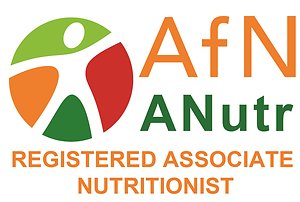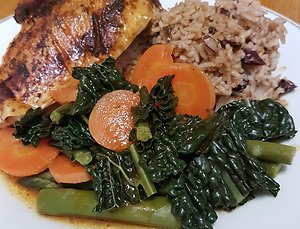
Cut Tummy Fat by Reducing Starchy Carbohydrate Intake
Being mixed race with an Indian Trinidadian mother and black Jamaican father, starchy foods such as roti, rice, yams and dumplings were staples in our house hold. With 5 hungry children to feed, sweet potato pudding and cornmeal pudding, along with a variety of cakes and scones, baked fresh every Saturday, were also on the menu!
Being young, with a fast metabolism and lots of sports and physical activity helping to burn off calories, none of my family ever questioned the effect these foods would have on our bodies, long term, apart from keep us FULL!
Fast forward to hormonal changes that take place when women have children and even further to our 40s when our metabolism starts to slow down preparing for menopause and beyond and we begin to see fat distribution shifting to the trunk, front and back!
So what is going on here?
Large amounts of Carbohydrates like rice, breads and cakes, Potatoes and yams and Cereals are converted to glucose for entry into the blood stream. Insulin then acts to regulate the blood glucose levels and reduces the amount in the blood, shuttling it into the muscles, brain and other cells. Insulin is a growth hormone among other things, so it converts any excess glucose into fat for storage in the fat cells around the abdomen.
There are 2 types of fat here, subcutaneous fat, the stuff you can pinch and the hard visceral fat deep in the abdomen, that surrounds the internal organs. Too much fat in this area, can lead to diabetes, high blood pressure and heart disease!
Black and South Asian people like myself are at greater risk of these health issues as we age, so try to reduce the starchy foods in your diet. Replace with increased amounts of vegetables and fruit which are packed with vitamins, mineral and antioxidants. Add nuts and seeds to help maintain a healthy heart, blood vessels and waistline!
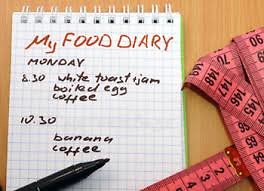
Keep a Food Diary
Keeping an honest and accurate food diary is a simple way to track your daily food and drink intake, helping you identify any deficiencies, or over indulgence in your diet that you can adjust over time to help you achieve your weight loss goals.
It is worth keeping in mind that to lose a pound of fat per week, you will need to reduce your calorie intake by 3,500 cals per week. This equates to 500cals per day.
A sedentary, overweight woman can't figure out why she is gradually gaining weight!
Her FOOD DIARY says she has 3 healthy meals a day, 2 of which contain 1 portions of vegetables. She has 2 snack breaks per day, with the morning one containing 3 chocolate digestive biscuits and a shop bought hot chocolate, and the afternoon break 1 pieces of fruit. After work she consumes 2 glasses of wine after dinner.
Lets see where she can reduce her calorie intake!
Her 2 main meals look reasonable healthy. Her morning snack is 3 chocolate digestive biscuits (total 222cals), a Costa Coffee Hot chocolate with marshmallow, cream and skimmed milk (300cals) and her two 250 ml glasses of red wine in the evening are 170cals each (total 340 cals ). All in, she consumes approx 2,200cals in every work day, with just around a 3rd of those calories coming from snacks and alcohol. Her hot chocolate drink, chocolate digestives and her 2 glasses of wine, amount to a grand daily total, of 862 snack cals per day. Total for all 5 days, 4,310cals.
To lose a pound of fat per week she would need to reduce her calorie intake by 3, 500cals per week.
To do this, she could replace her Hot Chocolate (300cals) with a skimmed milk, Cinnamon Latte (100cals), her chocolate digestives (300cals), with rich tea biscuits (93cals for 3) and reduce her wine intake to 1 glass per night (170cals). Total calories for 5 working days =1,815cals, a reduction of 2,495cals. With a small reduction in the portion size of other meals and a little physical activity a 3,500 calorie defecit is easily achievable.
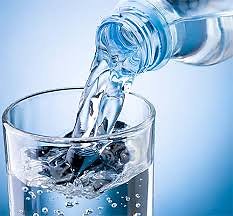
Increase Water Intake
Its easy to forget to , drink water when all around you are tucking into a Macchiato, or a Cafe Mocha Espresso, during their afternoon energy crash, but it's critical for weight loss success. According to the 'Obesity Journal', staying hydrated, reduces calorie intake and has a positive effect on the metabolism.
Thirst frequently masquerades as hunger, so check if you are thirsty before you reach for the chocolate biscuits, by drinking some water and waiting 15- 20mins. If you are indeed thirsty you could reduce your calorie intake over a week, by replacing some snacks or calorie laden drinks with calorie free water.
Your workouts and your weight loss results are affected when you are dehydrated. If you struggle to work out due to tiredness, you may well be dehydrated!
Not only do you need to be sipping water throughout the day to stay hydrated, but try to drink 5-7ml of water per kg of your body weight at least 4hrs before your workouts to make sure you can give 100% .
Additionally you could weigh yourself before and after workouts (empty bladder first) to help you tailor your water intake for your workouts and reduce workout tiredness.
If you weigh less after your workouts , the likelihood is you are not drinking enough.
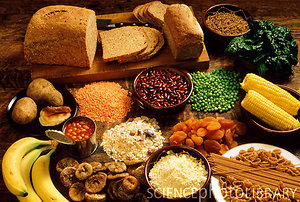
Increase Natural Fibre in Diet
Dietary Fibre is a type of carbohydrate (carbs) are found in plant based foods such as grains, fruits and vegetables. They come in 2 main forms 'Simple' and 'Complex'. Fibre is 1 of 2 complex carbs, soluble and insoluble. Soluble (fruit, oats and some beans and pulses) and insoluble, found in fruits and vegetables and wholemeal grains. These cannot be digested in the small intestine so pass through the digestive tract and into the large intestine or colon.
Benefits of Fibre in the Diet
A type of fibre called Beta Glucan, found in oats and barley and Pectins found in fruits such as apples and citrus fruits, have been shown to reduce cholesterol levels, cardiovascular disease and diabetes.
According to the 'British Nutrition Foundation', fibre has been found to help in weight loss, by increasing satiety, decreasing dietary intake and therefore reducing overall calories. Fibre also feeds and helps to increase good bacteria in the gut, helping to out number bad bacteria and reduce sugar cravings, which benefits overall health, weight management and immune system.
Increasing fibre in the diet helps to keep the digestive system healthy, by facilitating the movement of waste through the digestive tract and avoiding constipation.The current recommendations for fibre intake is 23-24g/day, with the average adult intake in the UK falling well below that at 18g/day.
SACN (The scientific Advisory Committee on Nutrition) recommends an increase to 30g/day and so does the American Heart Association.
Fibre containing foods
Cereals containing wholegrain, wholewheat breads and pasta, oats, rye and barley
Fruits including berries, pears, melon and oranges
Vegetables such as broccoli, sweetcorn and carrots
Beans , peas and pulses
Nuts and seeds
Potatoes with skins


